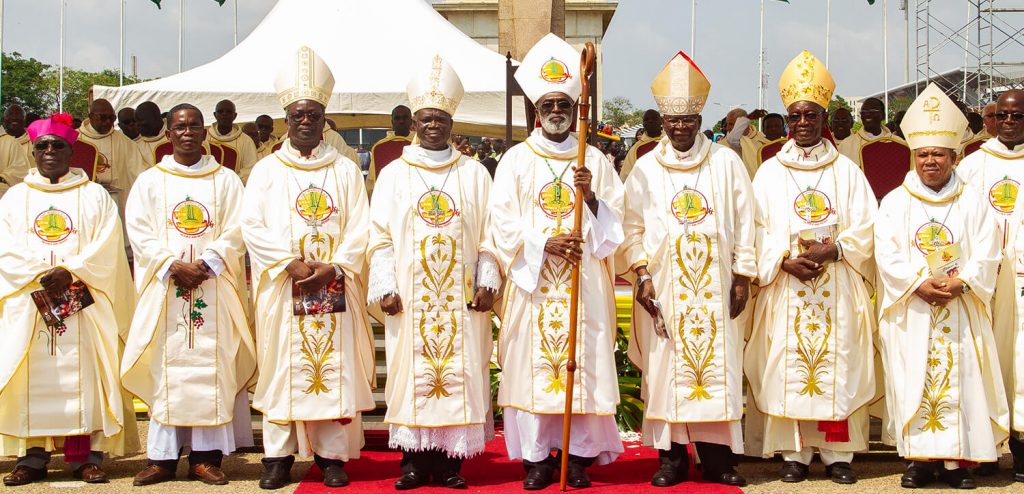
2020 LENTEN PASTORAL LETTER FROM THE GHANA CATHOLIC
BISHOPS’ CONFERENCE, (GCBC)
Theme:
“We implore you on behalf of Christ, be reconciled with God” (2 Cor 5:20)
1.0 Introduction
Dearly beloved in Christ Jesus, we, the Catholic Bishops of Ghana, welcome you to this year’s Lenten season. We wish to use this Pastoral Letter for personal and communal rejuvenation.Lent is here once more. This season, which begins on Ash Wednesday and culminates on Easter Sunday, is a period of forty days during which we are called upon to be reconciled with God, with one another and with nature through the three traditional works of mercy: almsgiving, fasting and prayer. Lent is a season for authentic reckoning with human weakness, sinfulness and the hope of reconciliation in the passion, death and resurrection of Jesus. The season invites us to reflection on our own individual and communal wrongdoings and leads us to repentance and transformation. This year, the season offers us another moment for prayerful reflection on the theme: “We implore you on behalf of Christ, be reconciled with God” (2 Cor 5:20). We are provided with an opportunity to realign ourselves with the message of salvation.
2.0 Paschal Mystery as the basis of conversion
During Lent, Christ offers us a moment of grace, metanoia and renewal. The Church calls us to have a share in the passion, death and resurrection of Christ. The season is a forty-day preparation for the Paschal Mystery of our Christian redemption. The Lenten fast, which is obligatory for all Catholics who are above 18 years and below
60 years, concerns personal asceticism, and sacrifice. It affords us the chance to fast not only from food and drinks but also from sin, bad habits, attitudes, luxurious and unhealthy lifestyles. We are enjoined to give away not only what we do not need but also what we need. We are to offload all the baggage that makes our Christian journey burdensome at the invitation of Christ who says: “Take my yoke and learn from me for I am gentle and humble of heart” (Matt 11:28). Lent calls us to a radical, never-ending and unconditional repooling of our life to the extent that Christ becomes the compass point by which and towards which we steer.
The conversion required of each Christian is addressed in a different way but the basic question that confronts us, no matter the circumstance of life, is always the same: Are we ready to allow God’s Spirit to lead us, even when that might be down the difficult road of reconciliation?
3.0 Lent: A Favourable Time for Reconciliation
During Lent, we are given another opportunity to learn that we stand together before God, in both guilt and reconciliation. To sin is to separate ourselves from the loving mercy of God as in the case of the prodigal son or like the elder son (in the Bible), who refused to heed to his father’s call to enter into his compassion and mercy. The language of this season is a symbol of our constant response to the call to accept and live in the loving mercy of God through the Sacrament of Penance/Reconciliation. There seems to be a loss of the sense of sin. We often deviate from the norm but frequently refer to those lapses as mistakes. We are encouraged throughout this season to turn back to God in sacramental confession whenever we fall into serious sin. We need to learn to accuse and pass sentence on ourselves whenever we go astray as the prodigal son did: “I have sinned against heaven and against you, I am not worthy to be called your son” (Luke 15:21). The mercy of God does not condemn or jail us when we accuse ourselves as guilty of sin. Rather it pardons us and heals us. We should make a conscious effort to reconcile, to bring back to harmony, to heal the division, separation and rupture with God, our fellow human beings and nature. The season wants us to be sacraments of unity. We are urged to go to sacramental confession frequently. According to Pope Francis (in Christus Vivit, #123), “Keep your eyes fixed on the outstretched arms of Christ crucified, let yourself be saved over and over again. And when you go to confess your sins, believe firmly in his mercy which frees you of your guilt. Contemplate his blood poured out with such great love, and let yourself be cleansed by it. In this way, you can be reborn ever anew”.
God is waiting for us sinners at the confessional. We should not rationalize sin but run to wash ourselves in the pool of mercy. It is only when we experience a right relationship with him, that we will have the zeal and motivation to contribute to the maturing and deepening of that relationship.
3.1 Reconciliation with God always causes us to have a ministry of reconciliation towards others. We are living in a world that encourages us to place our distinct cravings and goals first, even when satisfying those needs and yearnings comes at the expense of others.
For instance, in our world today, sexuality seems to be a means to control others and for individual satisfaction rather than a marital relationship and responsibility. Lent affords us an opportunity beyond feeling morose for sin and petition for God’s mercy to reconcile with those who have caused us much pain and hurt and have betrayed, injured and wounded us. We are to ask ourselves if the reconciling grace of God that has been lavished upon us is having a positive impact. We are to rekindle a reconciling attitude with regard to one another by ending our useless wrangling, by forgiving one another, by seeking reunion with grace and not with pride. As leaven in bread, our graced conduct must have a decisive and life-changing consequence on others. Every Christian is to serve as an emissary who talks of reconciliation and acts as a reconciler.
4.0 The Urgency of Reconciliation
The theme sets an important theological tone for Lent: “Be reconciled with God.” All of us have missed the mark in one way or the other. We are urged in this season to open our hearts to the graciousness of God who wants to reconcile, renew and transform us from the mess we have created for ourselves and others. Being reconciled with God is the agenda of the Christian life, especially during Lent, as we allow the penitential season of renewal to transform our lives. The need for reconciliation lies in the fact that our time on earth is limited: we are finite beings. We do not have all the time to live the grace that Christ offers us. We are here today and tomorrow we are no more. Now, and not any other day, is the favourable day to embrace God’s mercy that fills the finitude of our earthly lives with eternity. Today, and not tomorrow, is the day to accept and respond to the reconciliation wrought by Christ. As the Lenten trumpet blows to remind us that “We are dust and unto dust we shall return,” let all Christians allow nothing to turn their eyes from God’s mercy. Let your ears be open to the reality of human brokenness and finitude.
5.0 Lent: A Continuous Itinerary of Reformation
“The life of a monk ought to be a continuous Lent,” says St. Benedict. Using the inspiration of this holy man, the Church reminds all her children that the reconciliation required of us does not end with the penitential season. What Benedict tells his monks is equally true of every Christian. Though Lent is a forty-day journey, we are always called to interior penance, to stand up daily and confront the image of Christ which we have distorted and tainted by sin as individuals and as Church. A Lenten journey at the end of which we return to the status quo, our previous way of life is a betrayal of the spirit of the season. The call of Lent to make repeated amends and rectify what has to be corrected in order to embark on a joyful walk towards Easter is not restricted to this season. After this gracious season, nothing in our lives (violence, wickedness, selfishness, corruption, bribery, infidelity, sloth, etc.) should be as before. In this light, we encourage all Christians to reject whatever disfigures the image of Christ and His Church during and beyond this season. We appeal to all people of good will to wash away in this season the negligence of all other times.
6.0 Lent and Civil Duties Towards the 2020 Elections
We wish to call on all Christians of voting age to exercise their civic responsibilities in the forthcoming Presidential and Parliamentary elections. Following the footsteps of Jesus who did not shun his civil duties, all Christians should actively participate in the elections. We need to exercise our franchise conscientiously during the elections to secure a better country for tomorrow. We need to eschew the vote- buying syndrome and vote according to our conscience.
6.1 We appeal to the President of the Republic of Ghana and the security agencies to provide the necessary and conducive environment devoid of fear, intimidation and hooliganism. When people are not sure of their safety, they will not risk their lives to vote. Every human life is sacrosanct and needs to be protected. It is the duty of all Ghanaians to work hard to uphold the sanctity of human life before, during and after the forthcoming elections. The security agencies should be on top of the situation by being tactful and practical to prevent electoral insecurity.
6.2 We call on the Electoral Commission (EC) to remain an unbiased umpire in order to restore confidence in the electoral system. It should not be the case of “he who pays the piper calls the tune”.
It is urged to conduct free, fair and transparent elections. All the political parties are to be given a fair and level playing ground to contest the upcoming elections. We appeal to all political parties and their members to support and respect the independence and verdicts of the Electoral Commission. We encourage all the stakeholders to continue to use the Inter Party Advisory Committee (IPAC) sessions to engage the EC on their grievances.
6.3 Digital technologies have added zest to the ability of people to communicate. In this age, everybody is a journalist. We urge all Ghanaians to use the social media, internet, mobile phones, etc., in a more positive and better way. These devices are not to be used to fuel hate and violent speeches. Violence is the antithesis of peace and it prides itself on the sword. Jesus tells us: “for all who take the sword will perish by the sword” (Matt 26:52). Today, the sword can take the form of multiple registration, multiple voting, vigilantism, “macho” men who intimidate and steal ballot boxes, using the digital media to write and propagate damaging things. As we go to the polls this year, let all work harder than ever to shelve our swords of hatred, anger, bitterness, quarrels and killings, and reach out to each other in peace. It should be noted that the violent show of passion obstructs peace and makes harmony a difficult thing to achieve.
7.0 Conclusion
Beginning with Ash Wednesday, we appeal to all Christians to be confident in God’s compassion, love and mercy for us and His continued remarkable action in our world. Let each one of us make this year’s penitential season a unique forty-day journey with Jesus. We, your prelates, offer you God’s blessings and pray that you will use this special season to fall more deeply in love with Love Himself. Amen.

